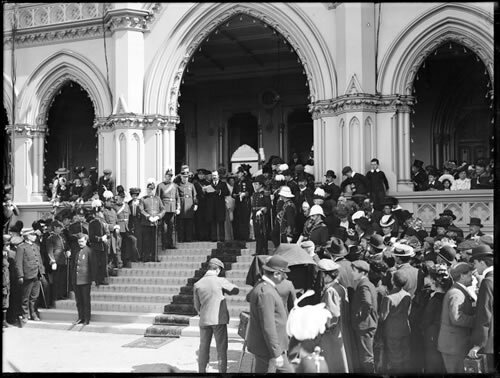Dominion Day declaration being read by Prime Minister Joseph Ward on the steps of Parliament (now the parliamentary library), 26 September 1907. Picture from NZ History.
This Saturday 26th September is Dominion Day, marking the day New Zealand declared itself a dominion within the British Empire in 1907, and ceased to be a colony. On Dominion Day 1907, British New Zealanders began to think about what it was that made them different from the United Kingdom. At the same time, our national symbols began to be shaped by Te Ao Māori. Māori and Pākehā have come a long way together, and while the process of reconciliation is not yet over we can now look now forward to living in a country where Māori and non-Māori, iwi and tauiwi, can understand and respect one another's cultures.
In 1907 we stopped being a colony. The New Zealand government took full responsibility for domestic issues. Colony status was considered by many Māori to represent the conquest of Aotearoa, and its end signalled the end of the period of formal colonisation. Since 1882, Māori deputations to the Sovereign had repeatedly sought redress from the Crown. In every attempt to raise their concerns they were referred back to the New Zealand government on the grounds that the imperial government was no longer responsible for such matters.
But since 1907 Māori have campaigned hard to win back the rights and resources they had lost. It is no surprise that Māori are the strongest supporters of a citizen of Aotearoa as our head of state. In the last poll New Zealand Republic ran on this issue, we found 80% of Māori support a citizen as head of state, much moreso than their Pākehā counterparts.
The status of the Treaty of Waitangi will not be diminished when we become a republic. If anything becoming a republic will place a crown on all our heads. It will bring the Treaty home to all New Zealanders. The road to a New Zealand head of state is a gateway to reconciliation. As we choose the values of the future we carry with us all of the wisdom of the past. Dominion Day is a day for us all to talk about the principles we will use to guide us into the future.


